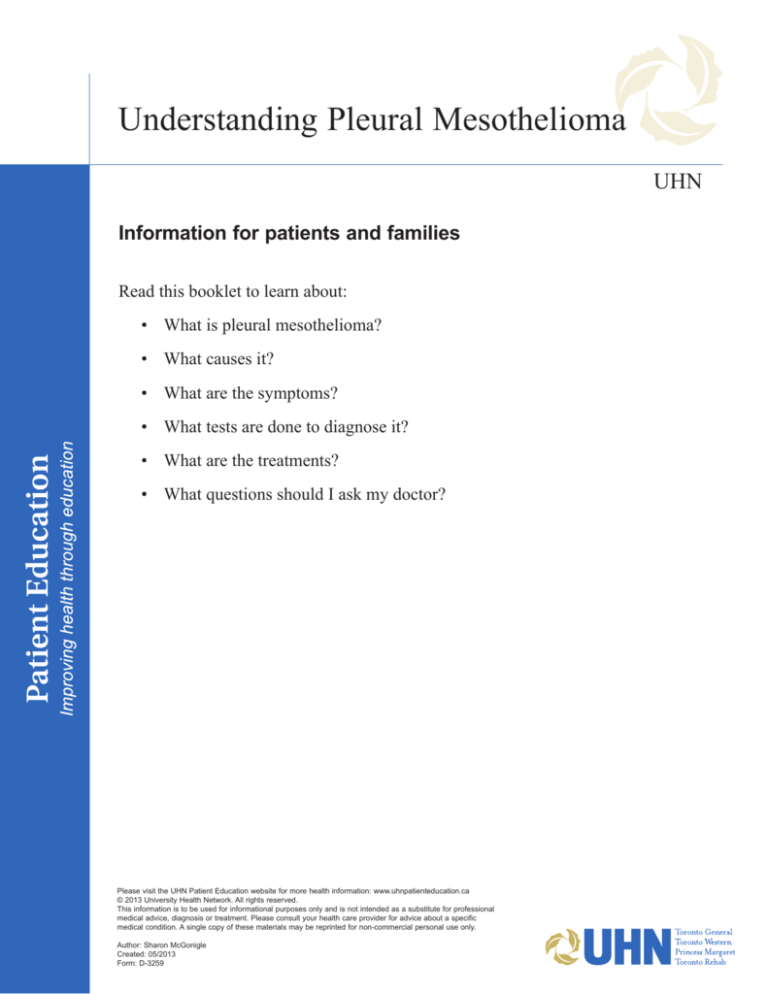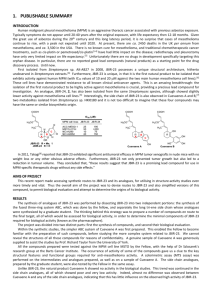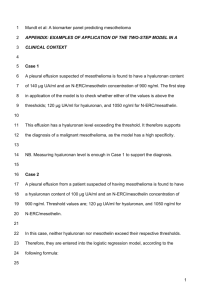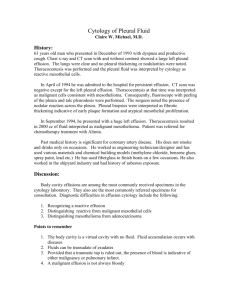
Understanding Pleural Mesothelioma
UHN
Information for patients and families
Read this booklet to learn about:
• What is pleural mesothelioma?
• What causes it?
• What are the symptoms?
• What tests are done to diagnose it?
• What are the treatments?
• What questions should I ask my doctor?
Please visit the UHN Patient Education website for more health information: www.uhnpatienteducation.ca
© 2013 University Health Network. All rights reserved.
This information is to be used for informational purposes only and is not intended as a substitute for professional
medical advice, diagnosis or treatment. Please consult your health care provider for advice about a specific
medical condition. A single copy of these materials may be reprinted for non-commercial personal use only.
Author: Sharon McGonigle
Created: 05/2013
Form: D-3259
What is pleural mesothelioma?
Pleural mesothelioma is cancer of the cells in the lining of the lung. These cells
are called mesothelial cells.
What is the mesothelium?
The mesothelium is a lining that covers most of your internal body organs.
The mesothelium has two layers of tissue:
1. Visceral layer: the inner layer that wraps around organs such as the lung,
heart or stomach.
2. Parietal layer: the outer layer that forms a sac around the inner layer.
The mesothelium has different names, depending on where it is in the body.
The layers of tissue that protect the lungs are called the pleura. The inner layer
covers the lungs, and the outer layer lines the inside wall of the chest. The space
between the two layers is filled with pleural fluid. This fluid allows the layers
to slide over each other so that you can breathe.
parietal layer
visceral layer
pleural fluid
mesothelioma
Image used with permission from CancerHelp UK
Patient information website - Cancer Research UK: www.cancerresearchuk.org/cancerhelp
2
How does pleural mesothelioma develop?
Pleural mesothelioma starts when normal cells from the lining of the lung begin to
change. The cells become cancerous and continue to grow. As the cancer cells grow
out of control, the pleural tissue thickens and presses on the lung.
Sometimes the cancer cells make extra fluid that collects between the two
layers of the pleura. This is called a pleural effusion. Changes to the pleura
or a pleural effusion can make you feel short of breath.
In the chest, the lungs and heart are close together. In some people, pleural
mesothelioma can spread into the pericardium, the layer of tissue covering
the heart.
What causes mesothelioma?
There is a strong link between mesothelioma and being exposed to asbestos.
Asbestos is a mineral rock made up of tiny fibres. It is widely used in building
materials and industry.
Asbestos fibres are very fine. If you breathe them in, they can end up in the
smallest airways of the lungs. These asbestos fibres can also make their way
through the lung tissue and settle in the pleura.
Mesothelioma may only develop many years after being exposed to asbestos.
Some people with mesothelioma do not know where or when they were
exposed.
Is there a way to screen for it?
Screening is testing people for a disease before they have any signs
or symptoms. At the moment, there are no reliable screening tests for
mesothelioma.
What are the symptoms of mesothelioma?
In the early stages of mesothelioma, there may be no symptoms. Symptoms
appear as the cancer grows. General symptoms may include unplanned weight
loss and night sweats.
3
Other symptoms of pleural mesothelioma are:
breathing
problems
• shortness of breath
• wheezing noises
cough
• gets worse or does not go away
pain
•
•
•
•
lower back
shoulder
ribs
side of your chest
trouble
swallowing
changes to
your voice
• sounding raspy
• strained
• changes in volume
How do I know if I have mesothelioma?
Mesothelioma can be hard to diagnose. You may have had several tests already.
At your visit to the hospital, we will:
• take your medical history
• do a physical exam
• arrange special tests to confirm the diagnosis
After we get the results, we may need to repeat some tests or do other tests.
This is important so you can get the right treatment.
4
What are the tests for mesothelioma?
Type of test
What can I expect?
Blood tests
You may need to have blood tests to check your
overall health.
CT Scan
This special scan uses X-rays to take pictures of
the inside of your body.
You will get a CT scan of your chest which can
show:
• any fluid or swelling
• the size and position of the mesothelioma
• if the cancer has spread to the lymph nodes,
the chest wall or other organs
Before the scan, you may get an injection of dye
called ‘contrast’. This makes the scan clearer to read.
Sometimes people can have an allergic reaction to
the contrast dye. Let your doctor know if you have a
reaction.
Thoracentesis
or Pleural
Aspiration
(fluid drainage)
Fluid can build up in the chest because cancer cells
make the pleura inflamed. To drain the fluid from
your chest:
• A small tube (called a catheter) is put into the
pleural space.
• A drainage bag is attached to the end of the
tube. This allows the fluid to drain and be
collected.
• Then a sample of the fluid is sent to a lab to
see if it contains cancer cells.
continued on next page
5
Biopsy
A biopsy removes a small piece of tissue. Then
the tissue is sent to a lab for testing. This will either
confirm or rule out a diagnosis of mesothelioma.
There are a few ways the biopsy can be done.
Needle Biopsy
A needle biopsy may be done using another CT
scan. This helps to see exactly where to collect the
sample.
• First you get a local anaesthetic to numb the area
where they are going to put the biopsy needle.
• Then a fine needle is put through the skin to
take out a small piece of tissue. This should not
be painful, but you may feel pressure when the
needle goes in.
Pleuroscopy
This is a procedure under general anaesthetic.
• First, small cuts (incisions) are made into the skin
of your chest.
• Then a flexible light and camera are inserted.
This allows the doctor to look at the lining of
your chest wall and lungs.
• Then the doctor will use small forceps to remove
a sample of the pleura.
6
Why is it hard to diagnose mesothelioma?
Mesothelioma can be hard to diagnose. This is because there are different types
of mesothelioma cells in a tumor. They can look like other types of cancer cells.
Mesothelioma cells can be grouped into 3 types.
This depends on how the cells look under the microscope:
1. epithelioid
2. sarcomatoid or fibrous
3. biphasic or mixed type, made up of epithelioid and sarcomatoid cells
If you have mesothelioma
The next step is to find out what stage of mesothelioma you have.
What are the stages?
The stage is a way to describe the cancer. The stage can tell you:
• where the cancer is
• if or where it has spread
• if it is affecting other organs in the body
There are 4 stages of pleural mesothelioma (Stages 1 to Stage 4). The higher
the number, the further the cancer has spread out into your body. Your doctor
will use the stage of your cancer to decide which treatment is best for you.
7
What tests are used for this?
To find out what stage of mesothelioma you have, you may need one or more
of these tests.
Endobronchial Ultrasound (EBUS)
You may have this test if the lymph nodes around your lung are enlarged.
First you will get medicine to make you drowsy or sedated. The doctor passes
a small tube into your mouth,and down the windpipe. Then it passes into the
smaller airway passages. It uses ultrasound to take pictures of the lung, pleura
and nearby lymph glands. The doctor may do a biopsy of any enlarged lymph
nodes at the same time.
Mediastinoscopy
You may have this test if the lymph nodes around your lung are enlarged.
This is a minor operation. It is done while you are asleep under a general
anesthetic. The doctor makes a small cut about 4 centimetres (2 inches) long
at the base of your neck. Then the doctor passes a small tube through the cut
to check the tissue there. Next, the doctor takes small samples of tissue. This is
called a lymph node biopsy.
PET Scan
PET scan is a type of test that takes pictures of the inside of your body. It uses a
small amount of a radioactive sugar. This helps find out if the cancer has spread
in the body.
MRI of the Brain
MRI is a type of test that uses a magnetic field and a computer to take detailed
pictures. It shows if the mesothelioma has spread to the brain.
8
What are the treatments for mesothelioma?
Mesothelioma is very difficult to treat. It is often not diagnosed until it is at
an advanced stage. It is also hard to predict how it will grow.
There are 2 main goals of treatment. The first is to control symptoms.
The second is to control the spread of the mesothelioma for as long as possible.
The best treatment for you depends on:
• the stage of your cancer
• other medical conditions you may have
• your general level of fitness
The main treatments are:
• chemotherapy
• radiation
• surgery
You may need a combination of treatments to get the best effects possible.
Type of
treatment
What can I expect?
Chemotherapy
• Uses powerful drugs to destroy cancer cells so that
they cannot grow or spread to other areas in the body
Radiation
therapy
• A beam of radiation is aimed at the cancer cells
• Radiation damages all cells in the path of the beam
• It damages both healthy cells and cancer
Surgery
• May be possible if you are are at an early stage
• You may also need radiation or chemotherapy before
or after surgery
If the mesothelioma is more advanced, chemotherapy and radiation can help to
control symptoms such as pain. You may get one of these treatments or both to
help with these symptoms.
9
What are the different types of surgery?
Surgery is not right for everyone. It is usually part of a plan that includes
radiation or chemotherapy and sometimes both.
There are 2 surgeries for pleural mesothelioma.
1. Extrapleural pneumonectomy (EPP)
2. Pleurectomy (decortication)
Extrapleural pneumonectomy (EPP)
This surgery removes the whole lung on the side where the mesothelioma is
growing. It removes:
• the lung
• the pleura
• possibly the diaphragm
• possibly the pericardium (the covering of the heart)
To be considered for this surgery:
• your mesothelioma must be at an early stage
• it must not have spread to the lymph nodes
• it cannot be growing into areas that are outside
the lung
• you must have a good level of fitness
People having an EPP often have radiation before surgery. This is part of a
clinical trial at The University Health Network. The clinical trial is a study to
explore new ways to treat this cancer.
10
Pleurectomy (decortication)
This surgery removes the pleura on the side where the mesothelioma is growing.
The surgeon will also take away as much of the mesothelioma as possible.
This surgery can:
• help control symptoms
• help to control the buildup of fluid in your chest
• reduce chest pain for some people
What if these treatments are not right for me?
Mesothelioma is often not found until it is at an advanced stage. Your body
may not be strong enough to cope with chemotherapy, radiation or surgery.
You can still receive care to help you. Supportive or palliative care can help
to relieve symptoms such as pain, breathing problems and weight loss.
What questions should I ask my doctor?
It is important to talk to your health care team and ask questions. This will help you
make decisions about your health care. Make a list of questions before you meet.
Here are some examples of questions you can ask:
What type of mesothelioma do I have?
What stage is the mesothelioma cancer?
Has it spread to my lymph nodes or anywhere else?
Can you explain my options for treatment?
How will this treatment help me?
11








